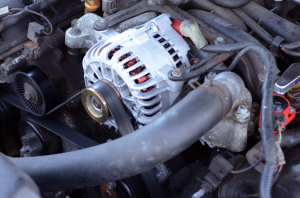![]() Monday – Thursday 7.30 am – 5.00 pm Friday 7.30 am to 4.00 pm
Monday – Thursday 7.30 am – 5.00 pm Friday 7.30 am to 4.00 pm
Are you having problems starting your car or maybe it starts, but only runs for a few minutes? Is it a fault caused by the battery? Well, perhaps; but there could be another reason, such as a defective alternator. To be certain, why not take your car to a mechanic in Wollongong, and have the electrical system inspected and at the same time obtain any service recommendations.
It’s the car’s alternator which puts all the work together, when it comes to powering the electrical components, such as the radio, headlights, power windows, dashboard instruments and other components. The battery is necessary for starting the car, but its job only starts there. It is the alternator that keeps the battery sustainable, by supplying it with power continuously, to keep your car always running.
You can find your car’s alternator bolted near the front of your engine. It is almost the size of a coconut and contains smaller components that helps in generating power. It is driven by a crankshaft, using a serpentine belt.
How long does a car’s alternator last? Generally, this component does not need too much attention, until, of course, it starts to fail. Alternators can last up to the lifetime of your vehicle or anywhere between from seven to ten years. There are signs that will tell you that your alternator is going failing. You should look out for flickering headlights, weak or dead battery, slow/malfunctioning accessories, whining or growling noise, trouble starting your car or frequent stalling, foul odour, and the battery warning light coming on in the dashboard. Once you notice any of these signs, don’t wait for a major problem to happen.
 There are some factors that can make your car’s alternator fail. Some examples are general wear and tear, overuse, heat damage, faulty parts, exposure to water and unraveled wire. Sometimes when you jumpstart your car incorrectly or when you install an electrical accessory that overloads power, this can cause alternator failure, Finally, when there’s leaking fluid in the alternator or a tight belt, this can also result in your alternator failing.
There are some factors that can make your car’s alternator fail. Some examples are general wear and tear, overuse, heat damage, faulty parts, exposure to water and unraveled wire. Sometimes when you jumpstart your car incorrectly or when you install an electrical accessory that overloads power, this can cause alternator failure, Finally, when there’s leaking fluid in the alternator or a tight belt, this can also result in your alternator failing.
When the car’s alternator starts to show problems as mentioned above, the electrical components will draw all of their power from the battery and the battery will start to weaken and eventually die. This is one reason why your alternator should be checked by a professional mechanic, even if you suspect that the battery or the starter maybe creating the problem.
1st Choice Mechanical offers alternator services through our experienced team of professionals, who are happy to inspect and provide solutions to your car’s electrical problems. Our technicians, after inspection, will be able to tell you if any issues need to be addressed or a replacement is required. Some car owners choose to replace their alternators with “rebuilt” units, but we recommend you buy a brand new alternator, even if it’s costs more, in the long run it’s the best choice for your peace of mind and will save costs in the long run.
When it comes to the performance of a car, the alternator is one of the most important components. The alternator is responsible for charging the battery and powering the electrical system of the car. However, just like any other mechanical component, the alternator can fail over time. In this blog, we will explore some of the most common reasons why a car alternator fails.
One of the most common reasons for alternator failure is bad bearings. Bearings are small metal balls that help the alternator shaft spin smoothly. Over time, these bearings can wear out and cause the alternator to make a loud grinding noise. If left unchecked, bad bearings can eventually cause the alternator to seize up completely.
Another common cause of alternator failure is worn brushes. Brushes are small carbon blocks that conduct electrical current between the stationary and rotating parts of the alternator. Over time, these brushes can wear down and cause the alternator to lose its ability to generate electricity. Symptoms of worn brushes include dim headlights and slow electrical accessory operation.
The voltage regulator is responsible for regulating the amount of electrical current that flows through the alternator. If the voltage regulator fails, it can cause the alternator to produce too much or too little power. Symptoms of a faulty voltage regulator include flickering lights and a dead battery.
The alternator is driven by a belt that connects it to the engine’s crankshaft. If this belt breaks or becomes worn, the alternator will not be able to generate electricity. Symptoms of a broken belt include a dead battery and the loss of power steering.
Alternators generate a lot of heat during operation. If the alternator is not properly cooled, it can overheat and fail. Symptoms of an overheated alternator include a burning smell and smoke coming from under the hood.
Please contact our mechanics at 1st Choice Mechanical for more information about car alternators, starters and batteries and to schedule an appointment. Call us on (02) 4228 7949 or visit us at www.wollongongmechanical.com.au, if you want to learn more about our full range of services,
We cover Shoalhaven Heads, Wollongong, Greenwell Point, Mount Pleasant, Albion Park Rail, Kiama, Figtree, Warilla, Worrigee, Corrimal ad surrounding areas.

If you need an experienced and honest mechanic in Wollongong, make 1st Choice Mechanical Repairs your only choice.
Licence. No: MVRL31591



All rights reserved 1st Choice Mechanical Repairs Copyright 2023